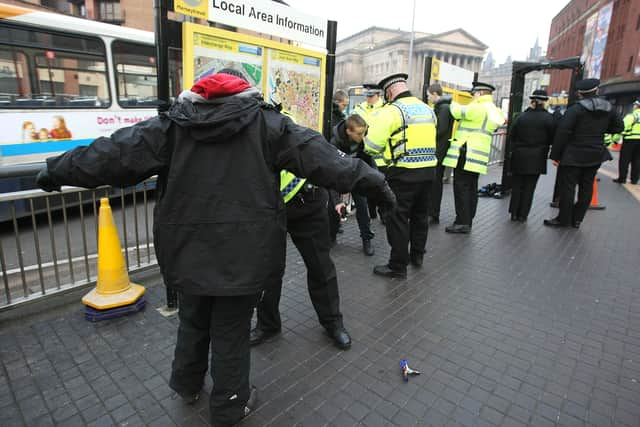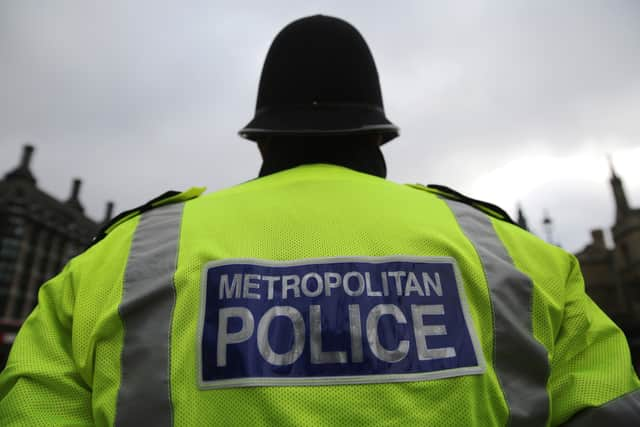What is a police strip-search? Meaning, what it involves, your rights and why it’s controversial
and live on Freeview channel 276
A recent report by Children’s Commissioner Dame Rachel de Souza revealed hundreds of children have been strip-searched by the Met Police, with figures increasing every year.
Data obtained showed that 650 children aged 10 to 17 were strip-searched by officers in London between 2018 and 2020.
Advertisement
Hide AdAdvertisement
Hide AdThe figures revealed that 95% of those were boys, and 58% were described as Black.
So what is a strip-search? What powers do the police have and what does the situation involve?
Here’s what you need to know.


What is a strip-search?
Police conducted strip-search is when officers are looking for concealed items, typically drugs or weapons, in a way that involves removing more than just the outer layer of clothes, such as coats or jackets.
In England and Wales, strip-searches are conducted when a person is reasonably suspected of a crime, or after a person has been arrested and is in custody.
Advertisement
Hide AdAdvertisement
Hide AdStrip-searches can also be carried out in the airport, and are known as an ‘enhanced hand search’ involving removing clothes as far as the underwear - which is the limit airport or contract screening personnel can go.
What does a strip-search involve?
Partial strip-searches see the removal of outer layers - such as a coat or a jacket - to make possible contraband easy to see. Items removed may be searched by hand, and the person may be subjected to a pat down - where an officer feels the body for abnormal objects. This can be done in public.
A full strip-down needs to be conducted in private, and requires people to remove all their clothes to their underwear - and in some cases they may be asked to remove their underwear. This is also known as a visual strip-search.
In some situations, such as prisons, officers may also conduct a cavity search to check for any objects. This is known as an ‘Intimate Search’, and can only happen if the police have a warrant and authorisation from a senior officer.
The aim of a strip-search is for security purposes.
Advertisement
Hide AdAdvertisement
Hide AdGenerally speaking, a person of the same gender should be conducting the strip-search - with many trans and non-binary people being denied this right.
What are the legal guidelines for a strip-search?
According to Citizens Advice Scotland, during a strip-search, the legal requirements are:
- the reason for the search should be fully explained to you
- there should always be at least two other people present
- the strip-search should be carried out by a person of the same sex (transgender people may request which sex of the person they want to search them)
- the search should take place in private, away from the view of members of the opposite sex (except a responsible adult that a child or vulnerable adult has asked to be present)
- if intimate body parts such as breasts or genitals will be exposed, there should be a minimum number of people present and no members of the opposite sex unless they are medical staff
- searches of people under 18 should take place with a responsible adult present, unless the child does not want them to be present
- you shouldn’t be required to remove all your clothing at the same time
- you may be asked to hold your arms up in the air, stand with your legs apart, open your mouth or bend forward, but you shouldn’t be touched
- you should be allowed to redress as quickly as possible.
What are your rights if you’re searched
Citizen’s Advice Scotland has listed the rights you have if you’re searched:
- Ask the officer to identify themselves
- The right to stay silent
- An explanation of what illegal item(s) they are searching for
- An explanation of the reasonable grounds of suspicion they have for the search
- Be searched in as private a place as possible
- Be searched by an officer of the same sex
- Be given a receipt of the search
The search must be recorded in writing. You can get a copy of the record of the search from the police within six months of the search. You shouldn’t be asked for your name, address or date of birth to complete the record if you decided not to provide it previously, but if you don’t you will not be able to obtain a copy of the search record.


Why are strip-searches controversial?
Advertisement
Hide AdAdvertisement
Hide AdStrip-searches are seen as an invasion of people’s privacy and bodily autonomy. They automatically have a power dynamic where the person being searched is placed in a position of vulnerability - and have often been described as humiliating and degrading.
Strip-searches are meant to be a security precaution, for officers of the law to tackle any potential crime and to protect the public. However, data is often not consistently recorded and compiled.
Recently, the story of Child Q, a 15-year-old Black schoolgirl who was accused by her teachers of smelling like cannabis and was subjected to a strip-search at her school in Hackney, London, caused outrage.
She was taken aside and strip-searched without another adult present whilst the officers knew she was menstruating.
Advertisement
Hide AdAdvertisement
Hide AdA report released today (8 August 2022) further revealed the number of strip-searching children aged between 10- 17 has increased.


In her report, Children’s Commissioner Dame Rachel de Souza said: “Today (8 August 2022), I am publishing Metropolitan Police data that I requested using my powers under the Children and Families Act 2014.
“Half of all strip-searches of children resulted in no further action taken, which calls into question whether these intrusive and traumatising searches were necessary at all.
“Between 2018 and 2020, 650 children were strip-searched – at a rate of nearly one a day in 2020.
Advertisement
Hide AdAdvertisement
Hide Ad“In some cases, these were children as young as 10 years old – a quarter of children searched were aged 15 or under.”
Dame Rachel spoke to ITV’s Good Morning Britain about her concerns about police handling. She said: “More worryingly, 25%, a quarter, of those had no appropriate adult there. That means no parent, no carer, no social worker, they were taken that the children are stopped and searched, not arrested, taken either to a police station or to home, one in five, we don’t even know where they were taken and subject to an intimate search.
“That 25%, without an appropriate adult, is really worrying. It’s a very traumatic experience and it needs to stop.”
